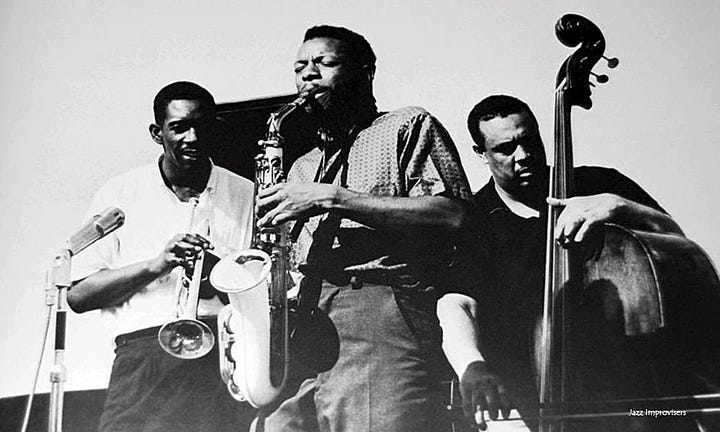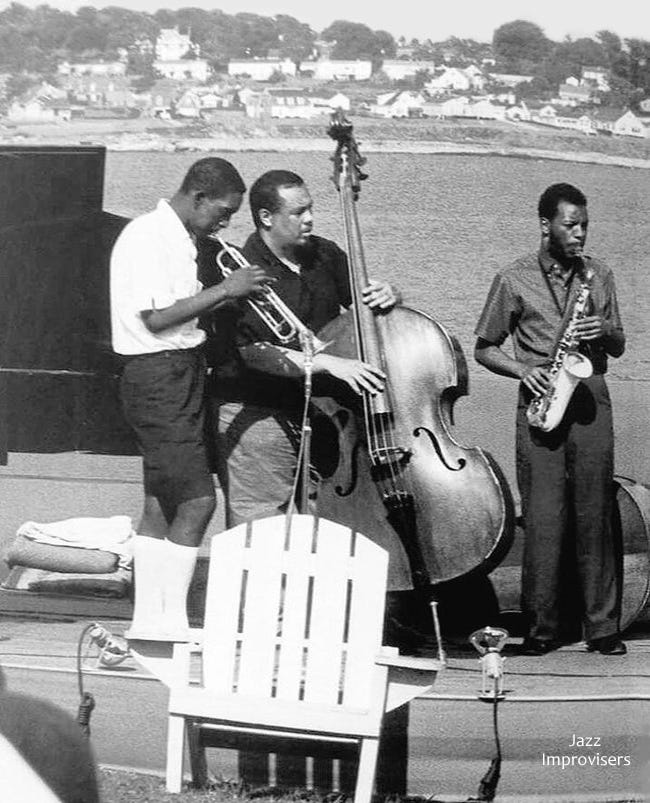(If you’re not already a Paying Subscriber, please consider becoming one. In addition to supporting my work, you’ll get frequent bonus items. For example, as another “Thank You,” at the bottom of this post you’ll find two versions of Dorham’s autobiographical essay.)
Kenny Dorham (1924-1972) was one of the most admired jazz trumpeters—and composers (he wrote “Blue Bossa” and others). He’s often referred to simply as “K.D.” His earliest audio interviews were with Swedish radio journalist Claes Dahlgren, who was based for many years in New York City. For other interviews by Dahlgren, only ever heard long ago in Sweden, with Miles, Cecil, Dolphy and others, see “Interviews by Dahlgren” in the Index on the home page.
We are able to hear this recording thanks to the generosity of The Claes Dahlgren Collection at The Centre for Swedish Folk Music and Jazz Research (Svenskt visarkiv). I want to personally thank Wictor Johansson, head of the audiovisual collections, and Jörgen Adolfsson, research archivist and musician, for their kind assistance.
Please Note that permission was given for the audio to appear in this essay series Only —no other copying or publishing of this recording is allowed without prior approval. Let us all please honor this, in which case more interviews will be coming your way. (I promise you that I still have some excellent ones to share.) In short, do not post the audio of this interview anywhere else—but please do share the link to this page with everyone you know! (If you see the word “Share” below, just click on that.)
You will notice throughout these interviews that Dorham tends to stay positive. He tries not to criticize others, but he makes it clear that he is having trouble surviving in the jazz business.
For the first interview, Dahlgren’s script (his written narration) is dated July 8, 1960. We know that the interview took place no later than July 4, because, as Claes states, he met with Dorham in the back of a car outside Cliff Walk Manor, a hotel in Newport, Rhode Island. From June 30 through July 4, 1960, in addition to the “official” Newport jazz festival, an alternative protest “Rebels” festival was held in and around that hotel (today known as The Chanler). Here are two photos from one of the concerts:


It must have been amazing, but none of the Rebels’ events were professionally recorded, despite initial plans to sell tapes of their concerts, which they had hoped to release on four LPs under the title Rebellion at Newport. (I have recently learned that there is a private recording about an hour long, but not of Dorham’s set. On the tape Dorham doesn’t solo and is only heard faintly and briefly in the background.)
In this interview, Kenny talks about his group with Charles Davis, Steve Kuhn, Butch Warren, and Buddy Enlow. (This group had recorded in February 1960. And Kuhn has spoken about meeting Dorham at the Lenox School of Jazz in the summer of 1959, and later being hired by Kenny.) Dorham says that audiences have trouble telling the difference between mediocre musicians and excellent ones. He also talks about how cool jazz brought back some older forms of music, by which I think he means classical styles such as baroque music.
Just two years later, Dahlgren spoke with Dorham again. (His script is dated November 23, 1962, so this was probably recorded shortly before then.) But Dorham’s situation was drastically different. He had been unable to find steady work playing jazz, so he was working six days a week selling musical instruments! In fact, the interview was conducted where he worked, in Manny’s Music Shop, West 48th Street, Manhattan. (Manny’s was well known to musicians and lasted from 1935-2009.) He explains that although he was booked by the same agency as the very busy Miles Davis, he only got a few gigs from them each year. His only day off at Manny’s is Sunday, and on that day he enjoys doing calisthenics at the gym, and playing at pool tables. On the positive side, he enjoys not having to tour, and having the freedom to choose whether to gig or not—that is, he doesn’t have to accept every gig, because he has another source of income. In his usual upbeat manner, he says “I hope I’m not bitter,” but underneath it all, he is clearly disappointed.
In case you’d like to hear more of Kenny Dorham speaking, below is a longer interview from August 1969. You will hear this interview as broadcast—that is, it is interspersed with recordings. Kenny’s portion ends after 43 minutes, and for the rest of the show the host, Jim Toman, plays various recordings. This is from a now-gone jazz station known as KJAZ (other stations have used the same “call letters”). The studio was in Alameda, just south of Oakland, California, and the broadcasts were heard all over the San Francisco area. At the time Dorham was performing at the Both/And Club in San Francisco.
Dorham speaks about Charlie Parker, and Rollins as well. He continues to search for ways to make a living, and he discusses getting the credentials to teach in New York City public schools as well as in other situations. He also mentions that he is working on an autobiography, and in it he also planned to discuss critics. (I thank collector Len Pogost for telling me about this. Unlike the Swedish interviews, which are available only here, this one was posted online.)
He never finished his autobiography, but he did complete some of it, which paying subscribers will read below, in two versions.
All the best,
Lewis
Keep reading with a 7-day free trial
Subscribe to Playback with Lewis Porter! to keep reading this post and get 7 days of free access to the full post archives.


